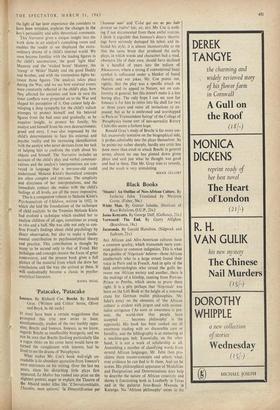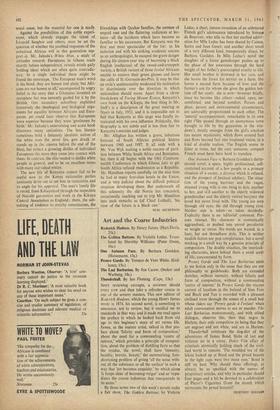Black Books
'Muntu': An Outline of Neo-African Culture. By Janheinz Jahn. Translated by Marjorie Grene. (Faber, 30s.) Jacaranda. By Gerald Hamilton. (Sidgwick and Jackson, 21s.)
ALL African and Afro-American cultures have a common quality, which transcends mere com- mon politics or common indignities. This is what the apostles of 'Negritude' believe—those African intellectuals who to a large extent found their voice in Paris and in French. And in spite of the field anthropologists who reveal the gulfs be- tween one African society and another, there is the makings of a kinship, running from Port-au- Prince to Pemba, which seems to prove them right. It is a pity perhaps that 'Negritude' was born on the Left Bank at the height of a renewed craze for German realist philosophies. Mr. Jahn's essay on the elements of 'the African culture' is strident with jargon and with existen- tialist arrogance ('As soon as awareness is pre- sent, the world-view that people have accepted . . . becomes philosophy' is the approach). His book has been cooked out of enormous reading with no discernible care or humility, and the bibliography is as menacing as a machine-gun belt. Essentially, on the other hand, it is not a work of scholarship at all. Assembling a number of classifying words from several African languages, Mr. Jahn then pro- claims them master-concepts and selects what- ever evidence he can find to fit them. And yet he scores. His philosophical apparatus of Modalities and Designations and Determinations does help to describe the nature of African creativity and shows it functioning both in Leadbelly in Texas and in the guitarist Jean-Boscb Mwenda in Katanga. No 'African philosophy' exists in the usual sense, but the material for one is ready.
Against the possibilities of this noble experi- ment, which already engages the talent of. Leopold Senghor and others, must be set the question of whether the jumbled responses of the urbanised African will in this generation sup- port Mr. Jahoda's White Man, a study of attitudes towards Europeans in Ghana made shortly before independence, reveals minds gaily holding ideas which are often quite contradic- tory. In a single individual there might be found the stereotype, 'The European man's word is his bond, they are honest and plain, but Afri- cans are not honest at all,' accompanied by angry belief in the story that a Ghanaian Invented an aeroplane but was instantly gaoled for it by the British. One secondary schoolboy explained intensively the theological and biological argu- ments for equality between Africans and Euro- peans, yet could later observe that Europeans were superior because they were 'gentlemen by birth.' Mr. Jahoda's entertaining and acute book discovers many curiosities. The less literate sometimes hold a fatuously idealistic notion of the white man (he never lies, gets drunk or stands up in the cinema before the end of the film), but evince a growing dislike of individual Europeans the more they come into contact with them. In contrast, the elite tended to dislike white people in general, and to be on excellent terms with many individual whites.
The new life of Kenyatta cannot fail to be useful now as the Kenya nationalist parties anxiously drive out to see him in rustication and to angle for his approval. The man's lonely life is retold, from Kikuyuland through the inspection of Nairobi gas-meters and work in the Kikuyu Central Association to England: there, the sub- mitting of evidence to starchy commissions, the friendships with Quaker families, the menace of unpaid rent and the flattering audiences at lec- tures—all the incidents which have become so familiar to his successors. But Kenyatta was the first and most spectacular of the lot: in his isolation and with his striking academic success as an anthropologist, he escaped the grave danger during his sixteen-year stay of becoming a black English intellectual of the tweed-and-crumpets variety, a British variant of those evolue Africans unable to remove their green glasses and leave' the cafes of St.-Germain-des-Pres. It may be that an exile's sentimentality weakened his inclination to discriminate over the direction in which nationalism should move. Apart from a clever breakdown of Facing Mount Kenya, Kenyatta's own book on the Kikuyu, the best thing in Mr. Delf's is a description of the great meeting at Nyeri in July, 1952, and it is impossible not to feel that Kenyatta at this stage was fatally in- toxicated with his own influence. Politically, this biography is not subtle and is less than fair to Kenyatta's enemies and judges.
Mr. Allighan has written a grave, laborious forecast of South African political history between .1960 and 1987. It all ends with a Mr. Van Wyk making a noble success of parti- tion between White South Africa and Bantustan, but then it all begins with the 1961 Common- wealth Conference in which Ghana fails to get South Africa refused readmission as a Republic. Mr. Hamilton reports carefully on the nice time he had at many first-class hotels in the Union, and is very judicial about the difficult political situation developing there. But underneath all this solemnity the old Norris lies concealed, occasionally reaching out to trip Mr. Hamilton into such remarks as (of Chief Luthuli), 'his view of the future is a black. one.'
NEAL ASCHERSON



































 Previous page
Previous page